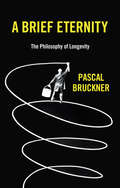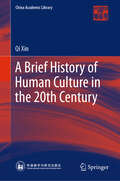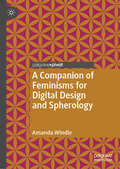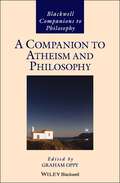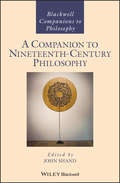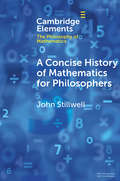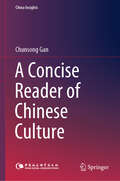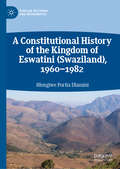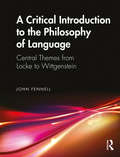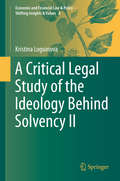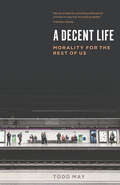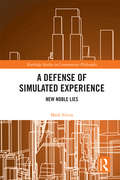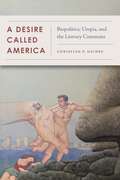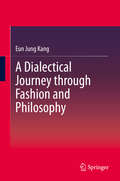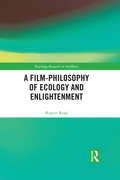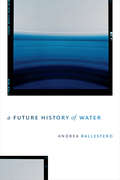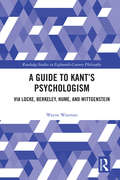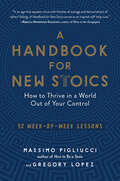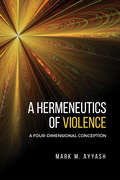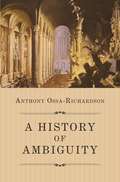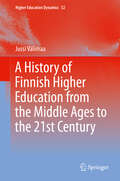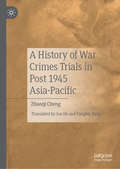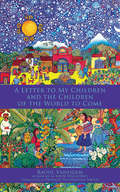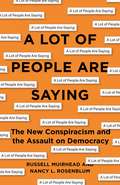- Table View
- List View
A Brief Eternity: The Philosophy of Longevity
by Pascal BrucknerThere is one fundamental thing that has changed in our societies since 1950: life has got longer. Over the last few generations, 20 or 30 years have been added to the duration of our lives. But after the age of 50, human beings experience a kind of suspension: no longer young, not really old, they are, as it were, weightless. It is a reprieve that leaves life open like a swinging door. The increase in life expectancy is a tremendous step forward that upsets everything: relations between generations, patterns of family life, the very meaning of our identity and our destiny. This reprieve is both exciting and frightening. The deadlines are getting shorter, the possibilities are shrinking, but there are still discoveries, surprises and upsetting love affairs. Time has become a paradoxical ally: instead of killing us, it carries us forward. What to do with this ambiguous gift? Is it only a question of living longer or living more intensely? To continue along the same path or to branch out and start again? What about remarriage, a new career? How to avoid the weariness of living, the melancholy of the twilight years, how to get through great joys and great pains? Nourished by both reflections and statistics, drawing on the sources of literature, the arts and history, this book proposes a philosophy of longevity based not on resignation but on resolution. In short, an art of living this life to the full. Is there not a profound joy in being alive at the age when our ancestors already had one foot in the grave? This book is dedicated to all those who dream of a new spring in the autumn of life, and want to put off winter as long as they can.
A Brief History of Human Culture in the 20th Century (China Academic Library)
by Qi XinThis book examines the cultural concepts that guided the development of the “age of mankind”— the changes that took place in historical, philosophical, scientific, religious, literary, and artistic thought in the 20th century. It discusses a broad range of major topics, including the spread of commercial capitalism; socialist revolutions; the two world wars; anti-colonialist national liberation movements; scientific progress; the clashes and fusion of Eastern and Western cultures; globalization; women’s rights movements; mass media and entertainment; the age of information and the digital society. The combination of cultural phenomena and theoretical descriptions ensures a unity of culture, history and logic. Lastly, the book explores the enormous changes in lifestyles and the virtualized future, revealing cultural characteristics and discussing 21st -century trends in the context of information technology, globalization and the digital era.
A Brief History of Schooling in the United States: From Pre-Colonial Times to the Present (The Cultural and Social Foundations of Education)
by Edward JanakThis book presents a sweeping overview of the historical and philosophical foundations of schooling in the United States. Beginning with education among the indigenous peoples of the Americas and going on to explore European models of schooling brought into the United States by European colonists, the author carefully traces the arc of educational reform through major episodes of the nation’s history. In doing so, Janak establishes links between schools, politics, and society to help readers understand the forces impacting educational policy from its earliest conception to the modern day. Chapters focus on the philosophical, political, and social concepts that shaped schooling of dominant and subcultures in the United States in each period. Far from being merely concerned with theoretical foundations, each chapter also presents a snapshot of the “nuts and bolts” of schooling during each period, examining issues such as pedagogical devices, physical plants, curricular decisions, and funding patterns.
A Companion of Feminisms for Digital Design and Spherology
by Amanda Windle<p>This book questions if spherology is a philosophy for designers, giving guidance on ways to read Spheres, how to approach the trilogy’s indexicality, and apply the key tropes and ethics of atmospheres to digital design. Each chapter includes a design-in, that is a practical entry point into the many tropes of Spheres including― bubbles, globes and foam. The book also applies spherology to an atmosphere design issue involving endangered species and geospatial threats to the environment. <p>Spherology refers to the Spheres trilogy by the philosopher Peter Sloterdijk, which traces spherical ideas, theories, sensations and feelings related to the philosophical concept of ‘being’ and the human-centered position of ‘being-in’. It is the first cynical, feminist companion of spherology to take a practice-led approach and to cover all three controversial volumes to with and against Spheres. Windle draws on feminist science and technology studies (STS) through parody within reading, writing and design practices. Design provides navigation so that academics and students can engage with spherology through an embodied concern with digital materiality. <p>As a feminist companion for today’s design issues, the book is an essential read for feminist STS scholars, design practitioners and digital R&D specialists working both in industry and academia, including more specifically data visualisers, interface and interaction designers.</p>
A Companion to Atheism and Philosophy (Blackwell Companions to Philosophy)
by Graham OppyPhilosophers throughout history have debated the existence of gods, but it is only in recent years that the absence of such a belief has become a significant topic of philosophical analysis, in particular for philosophers of religion. Although it is difficult to trace the historical contours of atheism as the lack of belief in a higher power, the reasoned, reflective, and thoughtful rejection of theism has become commonplace in many modern intellectual circles, including academic philosophy where disciplinary data indicates that a large majority of philosophers self-identify as atheists. As the first book of its kind to bring together a collection of writing on the philosophical aspects of atheism both historical and contemporary, the Companion to Atheism and Philosophy stages an explicit, constructive, and comprehensive conversation between philosophy and atheism to examine the ways in which atheist thought intersects with ideas and positions from a variety of philosophical and theological sub-disciplines. <P><P> The Companion begins by addressing the foundational questions and lingering controversies which underpin philosophical thought about atheism, exploring the implications of major developments in the history of philosophy for the modern atheistic worldview. Divided into eight distinct sections, essays consider a range of thinkers who were widely believed to have been atheists—including David Hume, Mary Wollstonecraft, Karl Marx, and Elizabeth Cady Stanton—and survey different kinds of objections to theism and atheism, including logical, evidential, normative, and prudential. Later chapters trace the relationship between atheism and metaphysics, epistemology, ethics, and political philosophy oriented around topics such as pragmatism, postmodernism, freedom, education, violence, and happiness. <P><P> Deftly curated and thoughtfully composed, A Companion to Atheism and Philosophy is the most ambitious and authoritative account of philosophical thinking on atheism available, and is a first-rate resource for academics, professionals, and students of philosophy, religious studies, and theology.
A Companion to Nineteenth-Century Philosophy (Blackwell Companions to Philosophy)
by John ShandInvestigate the challenging and nuanced philosophy of the long nineteenth century from Kant to Bergson Philosophy in the nineteenth century was characterized by new ways of thinking, a desperate searching for new truths. As science, art, and religion were transformed by social pressures and changing worldviews, old certainties fell away, leaving many with a terrifying sense of loss and a realization that our view of things needed to be profoundly rethought. The Blackwell Companion to Nineteenth-Century Philosophy covers the developments, setbacks, upsets, and evolutions in the varied philosophy of the nineteenth century, beginning with an examination of Kant’s Transcendental Idealism, instrumental in the fundamental philosophical shifts that marked the beginning of this new and radical age in the history of philosophy. Guiding readers chronologically and thematically through the progression of nineteenth-century thinking, this guide emphasizes clear explanation and analysis of the core ideas of nineteenth-century philosophy in an historically transitional period. It covers the most important philosophers of the era, including Hegel, Fichte, Schopenhauer, Mill, Kierkegaard, Marx, Nietzsche, Bradley, and philosophers whose work manifests the transition from the nineteenth century into the modern era, such as Sidgwick, Peirce, Husserl, Frege and Bergson. The study of nineteenth-century philosophy offers us insight into the origin and creation of the modern era. In this volume, readers will have access to a thorough and clear understanding of philosophy that shaped our world.
A Concise History of Mathematics for Philosophers (Elements in the Philosophy of Mathematics)
by John StillwellThis Element aims to present an outline of mathematics and its history, with particular emphasis on events that shook up its philosophy. It ranges from the discovery of irrational numbers in ancient Greece to the nineteenth- and twentieth-century discoveries on the nature of infinity and proof. Recurring themes are intuition and logic, meaning and existence, and the discrete and the continuous. These themes have evolved under the influence of new mathematical discoveries and the story of their evolution is, to a large extent, the story of philosophy of mathematics.
A Concise Reader of Chinese Culture (China Insights)
by Chunsong GanThis book uses the mutual interactions between Chinese and Western culture as a point of departure in order to concisely introduce the origins and evolution of Chinese culture at the aspects of constitution, thinking, values and atheistic. This book also analyzes utensil culture, constitution culture and ideology culture, which were perfected by absorbing classic arguments from academia. As such, the book offers an essential guide to understanding the development, civilization and key ideologies in Chinese history, and will thus help to promote Chinese culture and increase cultural awareness.
A Constitutional History of the Kingdom of Eswatini (African Histories and Modernities)
by Hlengiwe Portia DlaminiSwaziland—recently renamed Eswatini—is the only nation-state in Africa with a functioning indigenous political system. Elsewhere on the continent, most departing colonial administrators were succeeded by Western-educated elites. In Swaziland, traditional Swazi leaders managed to establish an absolute monarchy instead, qualified by the author as benevolent and people-centred, a system which they have successfully defended from competing political forces since the 1970s. This book is the first to study the constitutional history of this monarchy. It examines its origins in the colonial era, the financial support it received from white settlers and apartheid South Africa, and the challenges it faced from political parties and the judiciary, before King Sobhuza II finally consolidated power in 1978 with an auto-coup d’état. As Hlengiwe Dlamini shows, the history of constitution-making in Swaziland is rich, complex, and full of overlooked insight for historians of Africa.
A Critical Introduction to the Philosophy of Language: Central Themes from Locke to Wittgenstein
by John FennellA Critical Introduction to Philosophy of Language is a historically oriented introduction to the central themes in philosophy of language. Its narrative arc covers Locke’s ‘idea’ theory, Mill’s empiricist account of math and logic, Frege and Russell’s development of modern logic and its subsequent deployment in their pioneering program of ‘logical analysis’, Ayer and Carnap’s logical positivism, Quine’s critique of logical positivism and elaboration of a naturalist-behaviorist approach to meaning, and later-Wittgenstein’s ‘ordinary language philosophy’-inspired rejection of the project of logical analysis. Thus, it historically situates the two central programs in early twentieth-century English-speaking philosophy -- logical analysis and logical positivism -- and discusses the central critiques they face later in the century in the works of Quine and the later-Wittgenstein. Unlike other secondary studies in philosophy of language, A Critical Introduction to Philosophy of Language is not just a ‘greatest hits album’, i.e., a discontinuous compilation in which classics in the field are presented together with their standard criticisms one after the other. Instead, Fennell develops a particular, historical-thematic narrative in which the figures and ideas he treats are introduced in highly intentional ways. And by cross-referencing them throughout his discussions, he highlights the contributions they make to the narrative they comprise.
A Critical Legal Study of the Ideology Behind Solvency II (Economic and Financial Law & Policy – Shifting Insights & Values #4)
by Kristina LoguinovaThis book analyzes the impact of Solvency II. In recent years, EU legislators have sought to introduce fundamental reforms. Whether these reforms were indeed fundamental is critically investigated with regard to a post-crisis piece of financial legislation affecting the EU’s largest institutional investors: Solvency II. Namely, the last financial and economic crisis, the worst financial catastrophe of the last decade, revealed that financial law in particular was not sufficiently mature to maintain the existence of a robust and trust-worthy financial system that could protect society from economic decline. The work also makes concrete recommendations on achieving a more sustainable future. As such, it offers a valuable resource for anyone who is interested in the financial system, the EU political economy, insurance, sustainability, and Critical Legal Studies.
A Decent Life: Morality for the Rest of Us
by Todd May“In lively prose, May . . . breaks down complex philosophical concepts and uses a range of everyday examples to illustrate how morality can be practical.” —Publishers WeeklyIn a world full of suffering and deprivation, it’s easy to despair—and it’s also easy to judge ourselves for not doing more. Even if we gave away everything we own and devoted ourselves to good works, it wouldn’t solve all the world’s problems. It would make them better, though. So is that what we have to do? Is anything less a moral failure? Can we lead a fundamentally decent life without taking such drastic steps?Todd May has answers. He’s not the sort of philosopher who tells us we have to be model citizens who display perfect ethics in every decision we make. He’s realistic: he understands that living up to ideals is a constant struggle. In A Decent Life, May leads readers through the traditional philosophical bases of a number of arguments about what ethics asks of us, then he develops a more reasonable and achievable way of thinking about them, one that shows us how we can use philosophical insights to participate in the complicated world around us. He explores how we should approach the many relationships in our lives—with friends, family, animals, people in need—through the use of a more forgiving, if no less fundamentally serious, moral compass. With humor, insight, and a lively and accessible style, May opens a discussion about how we can, realistically, lead the good life that we aspire to.“A meditation on how striving for decency is a route towards personal satisfaction and happiness.” —Chicago Tribune
A Defense of Simulated Experience: New Noble Lies (Routledge Studies in Contemporary Philosophy)
by Mark SilcoxThis book defends an account of the positive psychological, ethical, and political value of simulated human experience. Philosophers from Plato and Augustine to Heidegger, Nozick, and Baudrillard have warned us of the dangers of living on too heavy a diet of illusion and make-believe. But contemporary cultural life provides broader, more attractive opportunities to do so than have existed at any other point in history. The gentle forms of self-deceit that such experiences require of us, and that so many have regarded as ethically unwholesome or psychologically self-destructive, can in fact serve as vital means to political reconciliation, cultural enrichment, and even (a kind of) utopia. The first half of the book provides a highly schematic definition of simulated experience and compares it with some claims about the nature of simulation made by other philosophers about what it is for one thing to be a simulation of another. The author then provides a critical survey of the views of some major authors about the value of certain specific types of simulated experience, mainly in order to point out the many puzzling inconsistencies and ambiguities that their thoughts upon the topic often exhibit. In the second half of the book, the author defends an account of the positive social value of simulated experience and compares his own position to the ideas of a number of utopian political thinkers, as well as to Plato's famous doctrine of the "noble lie." He then makes some tentative practical suggestions about how a proper appreciation of the value of simulated experience might influence public policy decisions about such matters as the justification of taxation, paternalistic "choice management," and governmental transparency. A Defense of Simulated Experience will appeal to a broad range of philosophers working in normative ethics, aesthetics, the philosophy of technology, political philosophy, and the philosophy of culture who are interested in questions about simulated experience. The book also makes a contribution to the emerging field of Game Studies.
A Desire Called America: Biopolitics, Utopia, and the Literary Commons
by Christian HainesCritics of American exceptionalism usually view it as a destructive force eroding the radical energies of social movements and aesthetic practices. In A Desire Called America, Christian P. Haines confronts a troubling paradox: Some of the most provocative political projects in the United States are remarkably invested in American exceptionalism. Riding a strange current of U.S. literature that draws on American exceptionalism only to overturn it in the name of utopian desire, Haines reveals a tradition of viewing the United States as a unique and exemplary political model while rejecting exceptionalism’s commitments to nationalism, capitalism, and individualism. Through Walt Whitman, Emily Dickinson, William S. Burroughs, and Thomas Pynchon, Haines brings to light a radically different version of the American dream—one in which political subjects value an organization of social life that includes democratic self-governance, egalitarian cooperation, and communal property.A Desire Called America brings utopian studies and the critical discourse of biopolitics to bear upon each other, suggesting that utopia might be less another place than our best hope for confronting authoritarianism, neoliberalism, and a resurgent exclusionary nationalism.
A Dialectical Journey through Fashion and Philosophy
by Eun Jung KangThis book takes an in-depth look at the integration of fashion and philosophy. It challenges the deeply rooted prejudice or misconception that fashion is a field limited to body-oriented and appearance-related themes and practices. It also reveals that fashion is intermeshed with distinctively modern issues that belong to the realm of the mind as well as the body. In doing so, it refashions philosophy and philosophizes fashion, which ultimately amount to the same thing. The book argues that while the philosophization of fashion can give a clearer understanding of some esoteric areas of philosophy and fashion’s close connection to modern societies and politics, it also shows that philosophy can assist in redeeming fashion from the objective, bodily world, positioning it as an indispensable part of the humanities. This is because fashion manifests critical aspects of human culture in our time, and is an expression of the zeitgeist, which is interwoven with the unfolding of history. This book will be highly relevant to students and researchers in fashion studies who are looking for the theoretical underpinnings and insights for their own work. It will also be of keen interest to scholars in the field of philosophy who are seeking to apply philosophical concepts to both everyday life and our empirical world.
A Film-Philosophy of Ecology and Enlightenment (Routledge Research in Aesthetics)
by Rupert ReadInspired by the philosophy of Wittgenstein and his idea that the purpose of real philosophical thinking is not to discover something new, but to show in a strikingly different light what is already there, this book provides philosophical readings of a number of ‘arthouse’ and Hollywood films. Each chapter contains a discussion of two films—one explored in greater detail and the other analyzed as a minor key which reveals the possibility for the book's ideas to be applied across different films, registers, and genres. The readings are not only interpretive, but they offer a way of thinking and feeling about, with, and through films which is genuinely transformative. Rupert Read’s main contention is that certain films can bring about a change in how we see the world. He advocates an ecological approach to film-philosophy analysis, arguing that film can re-shape the viewer’s relationship to the environment and other living beings. The transformative 'wake-up call' of these films is enlightenment in its true sense. The result is a book that ambitiously aims to change, though film, how we think of ourselves and our place in the world, at a time when such change is more needed than ever before.
A Future History of Water
by Andrea BallesteroBased on fieldwork among state officials, NGOs, politicians, and activists in Costa Rica and Brazil, A Future History of Water traces the unspectacular work necessary to make water access a human right and a human right something different from a commodity. Andrea Ballestero shows how these ephemeral distinctions are made through four technolegal devices—formula, index, list and pact. She argues that what is at stake in these devices is not the making of a distinct future but what counts as the future in the first place. A Future History of Water is an ethnographically rich and conceptually charged journey into ant-filled water meters, fantastical water taxonomies, promises captured on slips of paper, and statistical maneuvers that dissolve the human of human rights. Ultimately, Ballestero demonstrates what happens when instead of trying to fix its meaning, we make water’s changing form the precondition of our analyses.
A Guide to Kant’s Psychologism: via Locke, Berkeley, Hume, and Wittgenstein (Routledge Studies in Eighteenth-Century Philosophy)
by Wayne WaxmanThis book presents an interpretation of Kant’s Critique of Pure Reason as a priori psychologism. It groups Kant’s philosophy together with those of the British empiricists—Locke, Berkeley, and Hume—in a single line of psychologistic succession and offers a clear explanation of how Kant’s psychologism differs from psychology and idealism. The book reconciles Kant’s philosophy with subsequent developments in science and mathematics, including post-Fregean mathematical logic, non-Euclidean geometry, and both relativity and quantum theory. It also relates Kant’s psychologism to Wittgenstein’s later conception of language. Finally, the author reveals the ways in which Kant’s philosophy dovetails with contemporary scientific theorizing about the natural phenomenon of consciousness and its place in nature. This book will be of interest to Kant scholars and historians of philosophy working on the British empiricists.
A Handbook for New Stoics: How To Thrive In A World Out Of Your Control--52 Week-by-week Lessons
by Massimo Pigliucci Gregory LopezA pragmatic philosophy more popular than ever—here are 52 ancient lessons to help you overcome adversity and find tranquility in the modern world Stress often comes from situations that are beyond our control—such as preparing for a meeting, waiting for test results, or arguing with a loved one. But we can control our response to these everyday tensions—through the wisdom and practice of Stoicism. Stoicism is an ancient pragmatic philosophy that teaches us to step back, gain perspective, and act with intention. In A Handbook for New Stoics, renowned philosopher Massimo Pigliucci and seasoned practitioner Gregory Lopez provide 52 week-by-week lessons to help us apply timeless Stoic teachings to modern life. Whether you’re already familiar with Seneca and Marcus Aurelius, or you’re entirely new to Stoicism, this handbook will help you embrace challenges, thrive under pressure, and discover the good life!
A Hermeneutics of Violence: A Four-Dimensional Conception
by Mark M. AyyashAttention to the elusiveness of violence opens up a rich landscape of analysis, whereby social scientists can examine the often-overlooked transformative dimensions of violent acts. Theories of violence are numerous today, but because of the mysterious nature of violence, and how each individual or group may endure it uniquely, its study cannot be limited to one specialized and highly restricted field. A Hermeneutics of Violence seeks to remedy this problem by placing in dialogue various theories of violence from the disciplines of anthropology, sociology, international relations, and philosophy. This study uses a four-dimensional lens to examine the many facets of violence, including its instrumental, linguistic, mimetic, and transcendental dimensions. Far from irreconcilable, these positions, when placed within a four-dimensional outlook, open up new avenues for the study of particular cases of violence. Exploring the complex interactions, for instance, of "enemy-siblings," Mark M. Ayyash reveals "postures of incommensurability" that continuously produce conflictual positions across a spectrum of time and space and demand the release of violence. The book concludes that these postures must be understood and deconstructed before we can have a legitimate chance to achieve peace and justice, the conceptions of which must come with the intent of not necessarily opposing violence but rather replacing our conceptions of what the violences have come to constitute as "real."
A History of Ambiguity
by Anthony Ossa-RichardsonEver since it was first published in 1930, William Empson’s Seven Types of Ambiguity has been perceived as a milestone in literary criticism—far from being an impediment to communication, ambiguity now seemed an index of poetic richness and expressive power. Little, however, has been written on the broader trajectory of Western thought about ambiguity before Empson; as a result, the nature of his innovation has been poorly understood.A History of Ambiguity remedies this omission. Starting with classical grammar and rhetoric, and moving on to moral theology, law, biblical exegesis, German philosophy, and literary criticism, Anthony Ossa-Richardson explores the many ways in which readers and theorists posited, denied, conceptualised, and argued over the existence of multiple meanings in texts between antiquity and the twentieth century. This process took on a variety of interconnected forms, from the Renaissance delight in the ‘elegance’ of ambiguities in Horace, through the extraordinary Catholic claim that Scripture could contain multiple literal—and not just allegorical—senses, to the theory of dramatic irony developed in the nineteenth century, a theory intertwined with discoveries of the double meanings in Greek tragedy. Such narratives are not merely of antiquarian interest: rather, they provide an insight into the foundations of modern criticism, revealing deep resonances between acts of interpretation in disparate eras and contexts. A History of Ambiguity lays bare the long tradition of efforts to liberate language, and even a poet’s intention, from the strictures of a single meaning.
A History of Finnish Higher Education from the Middle Ages to the 21st Century (Higher Education Dynamics #52)
by Jussi VälimaaThis book unravels the origins, continuities, and discontinuities of Finnish higher education as part of European higher education from the Middle Ages to the 21st century. It describes the emergence of universities in the Middle Ages and the Finnish student, and moves on to the Reformation and the end of Swedish rule. It then discusses the founding of the Royal Academy of Turku, its professors and governing bodies, its role as a community, student numbers, the research and controversies. Travelling through the age of autonomy, the first decades of independence and the Second World War, the book examines the expansion of higher education, the development of the system, and the establishment of polytechnics. It concludes by analysing the multiple institutional and organisational layers of Finnish higher education. Altogether, the book offers an historical study that shows how and why education and higher education have been important in the process of making the Finnish nation and nation state.
A History of War Crimes Trials in Post 1945 Asia-Pacific
by Zhaoqi ChengWritten by the Director of the Tokyo Trial Research Centre at China's Shanghai Jiao Tong University, this book provides a unique analysis of war crime trials in Asia-Pacific after World War II. It offers a comprehensive review of key events during this period, covering preparations for the Trial, examining the role of the War Crimes Commission of the United Nations as well as offering a new analysis of the trial itself. Addressing the question of conventional war crimes, crimes against humanity, crimes against peace (such as the Pearl Harbor Incident) and violations of warfare law, it follows up with a discussion of post-trial events and the fate of war criminals on trial. Additionally, it examines other Japanese war crime trials which happened in Asia, as well as considering the legacy of the Tokyo trial itself, and the foundation of a new Post-War International Order in East Asia.
A Letter to My Children and the Children of the World to Come
by Donald Nicholson-Smith John Holloway Raoul VaneigemSome 35 years after the May 1968 “events,” this short book poses the question of what kind of world we are going to leave to our children. A Letter to My Children and the Children of the World to Come provides a clear-eyed survey of the critical predicament into which the capitalist system has now plunged the world. At the same time, in true dialectical fashion, Vaneigem discerns all the signs of “a new burgeoning of life forces among the younger generations, a new drive to reinstate true human values, to proceed with the clandestine construction of a living society beneath the barbarity of the present and the ruins of the Old World.”
A Lot of People Are Saying: The New Conspiracism and the Assault on Democracy
by Nancy L. Rosenblum Russell MuirheadHow the new conspiracists are undermining democracy—and what can be done about itConspiracy theories are as old as politics. But conspiracists today have introduced something new—conspiracy without theory. And the new conspiracism has moved from the fringes to the heart of government with the election of Donald Trump. In A Lot of People Are Saying, Russell Muirhead and Nancy Rosenblum show how the new conspiracism differs from classic conspiracy theory, why so few officials speak truth to conspiracy, and what needs to be done to resist it.Classic conspiracy theory insists that things are not what they seem and gathers evidence—especially facts ominously withheld by official sources—to tease out secret machinations. The new conspiracism is different. There is no demand for evidence, no dots revealed to form a pattern, no close examination of shadowy plotters. Dispensing with the burden of explanation, the new conspiracism imposes its own reality through repetition (exemplified by the Trump catchphrase “a lot of people are saying”) and bare assertion (“rigged!”).The new conspiracism targets democratic foundations—political parties and knowledge-producing institutions. It makes it more difficult to argue, persuade, negotiate, compromise, and even to disagree. Ultimately, it delegitimates democracy.Filled with vivid examples, A Lot of People Are Saying diagnoses a defining and disorienting feature of today’s politics and offers a guide to responding to the threat.
